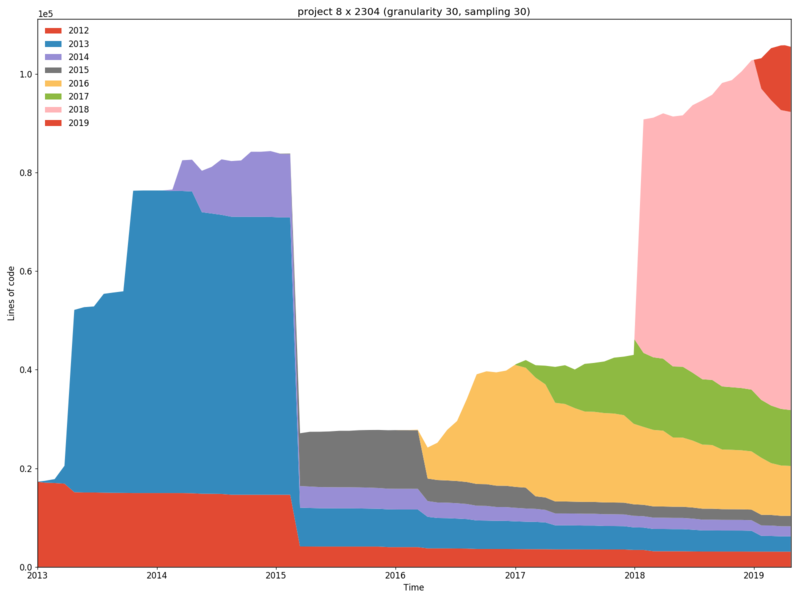first-timers-onlyissues are those which are written in a very engaging, welcoming way, far different than the usual "just report the bug" type of GitHub issue. To read more about these, check out firsttimersonly.com, which really captures how and why this works and is beginning to be a movement in open source coding outreach! Beyond the extra welcome, this also includes getting such well-formatted issues out in front of lots of people who may be contributing to open source software for the very first time.It takes a LOT of work to make a good issue of this type, and we often walk through each step required to actually make the requested changes -- the point is to help newcomers understand that a) they're welcome, and b) what the collaboration workflow looks like. Read more at https://publiclab.org/software-outreach !
Since early 2016, we at Public Lab are working to make our open source software projects more welcoming and inclusive and to grow our software contributor community in diversity and size. Creation of First-timers-only issues was also started at Public Lab near the end of 2016 - https://publiclab.org/notes/warren/10-31-2016/create-a-welcoming-first-timers-only-issue-to-invite-new-software-contributors
Now, as GSoC, Outreachy, and other outreach programs are seeking proposals for the upcoming summer, we put a lot of extra time and work into welcoming newcomers into our community and making sure they are well-supported. We've seen a huge increase in newcomers and wanted to report in about how this process has scaled!
Till now, nearly 409 FTO issues has been created across our projects which shows how many people have been welcomed in the Open Source 🌐 and in our community by the collaborative efforts of all of us.
From March 9, 2019, we started maintaining the list of people who want to work on various projects of Public Lab - https://github.com/publiclab/plots2/issues/4963 through first-timers-only issues. And, we are proud to announce that in past 20 days, we all have created 55 FTO issues i.e., 13% of total Public Lab FTO issues(from beginning) are created in last 20 days. The growth is really tremendous and all this has been possible due to contribution of each community member.
The idea of maintaining the list of FTO issue-seekers is a big success. We have been able to assign issues to nearly 50 contributors in the past 20 days. And, each day the list is growing and we are opening more and more FTO issues for helping new contributors in taking their first-step in Open Source with Public Lab.
Those community members who have shown some tremendous support for creating FTO issues and they really ensured that there is a check mark next to the name of each newcomer: @cess @gauravano @warren @lekhidugtal @Harshithpabbati @divyabaid16 @IshaGupta18 @anan12 @sashadev-sky @madeofhuman @HarshK @Divy123 @Rishabh570 @gautami_gg
Thank you everyone for the great work and cheers to this awesome community growth 🎉 🥂 💯
(The main image is a screenshot taken from GitHub Visualizer. To see the whole visualization, visit the link
- http://ghv.artzub.com/#repo=plots2&climit=100&user=publiclab and pressing run)

15 Comments
@gauravano has marked @warren as a co-author.
Reply to this comment...
Log in to comment
🎉🎉🎉🎉
Reply to this comment...
Log in to comment
Hello! HarshKhandeparkar, Divy123 and some others are not real profiles on this site. Please update the profiles. Mine is @HarshK
Reply to this comment...
Log in to comment
Actually you can add links to their github accounts instead of mentioning PL profiles.
Reply to this comment...
Log in to comment
hey @HarshK, as most of the contributors also have their account with Public Lab so I think it's fine. Although, we can use this suggestion next time and add both, maybe. Thanks!
Reply to this comment...
Log in to comment
🙌 🙌
Reply to this comment...
Log in to comment
Added a line on the increase in "Outreachy/GSoC season"! 🙌
Great!
Reply to this comment...
Log in to comment
I wanted to share a set of graphs I made using a system called
hercules-- https://github.com/src-d/herculesIt's designed for making a whole bunch of different types of graphs, but a few that interested me - here's one that shows the amount of code (i think measured in lines of code) colored by which person committed it -- here's the graph for
plots2:I don't like that, because it's by lines of code, a lot of the base framework code is credited to me -- which isn't really fair for a lot of reasons. Maybe i'd like one where the "influence" of old code wanes over time? I dunno.
Note that some of the biggest trends here - cliffs and drop-offs - are probably from generating and/or deleting
Here's the same type of graph for
image-sequencer:Here, i'll post more in a sec... and add annotations too!
Is this a question? Click here to post it to the Questions page.
it won't let me like your comments right now for some reason but these are really cool! They deserve their own note!
Agree with Sasha, posting a separate note would be great 😄 !!
Reply to this comment...
Log in to comment
Here's a different type of
herculeschart called a "burndown":Is this a question? Click here to post it to the Questions page.
So the "burndown" shows how much of the codebase at any given point, was written in each year. These were generated in ~March 2019!
Here's the
image-sequencerburndown!And MapKnitter:
Spectral Workbench:
Is this a question? Click here to post it to the Questions page.
Here's Leaflet.DistortableImage:
Is this a question? Click here to post it to the Questions page.
Reply to this comment...
Log in to comment
Interesting !!
Reply to this comment...
Log in to comment
Login to comment.